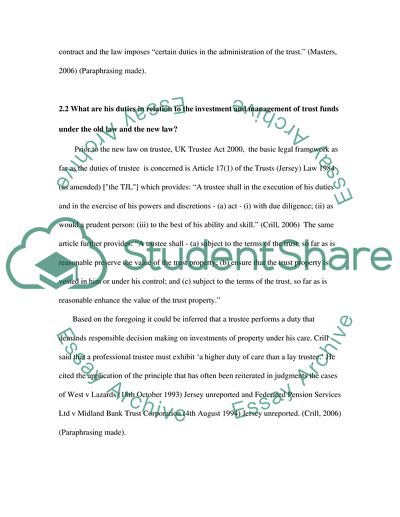Cite this document
(A Trustee's Perspective on Investment Essay Example | Topics and Well Written Essays - 2500 words, n.d.)
A Trustee's Perspective on Investment Essay Example | Topics and Well Written Essays - 2500 words. Retrieved from https://studentshare.org/finance-accounting/1706260-examine-a-trustees-duties-in-relation-to-the-investment-and-management-of-trust-funds-ignoring-the-management-of-real-and-leasehold-property
A Trustee's Perspective on Investment Essay Example | Topics and Well Written Essays - 2500 words. Retrieved from https://studentshare.org/finance-accounting/1706260-examine-a-trustees-duties-in-relation-to-the-investment-and-management-of-trust-funds-ignoring-the-management-of-real-and-leasehold-property
(A Trustee'S Perspective on Investment Essay Example | Topics and Well Written Essays - 2500 Words)
A Trustee'S Perspective on Investment Essay Example | Topics and Well Written Essays - 2500 Words. https://studentshare.org/finance-accounting/1706260-examine-a-trustees-duties-in-relation-to-the-investment-and-management-of-trust-funds-ignoring-the-management-of-real-and-leasehold-property.
A Trustee'S Perspective on Investment Essay Example | Topics and Well Written Essays - 2500 Words. https://studentshare.org/finance-accounting/1706260-examine-a-trustees-duties-in-relation-to-the-investment-and-management-of-trust-funds-ignoring-the-management-of-real-and-leasehold-property.
“A Trustee'S Perspective on Investment Essay Example | Topics and Well Written Essays - 2500 Words”, n.d. https://studentshare.org/finance-accounting/1706260-examine-a-trustees-duties-in-relation-to-the-investment-and-management-of-trust-funds-ignoring-the-management-of-real-and-leasehold-property.


